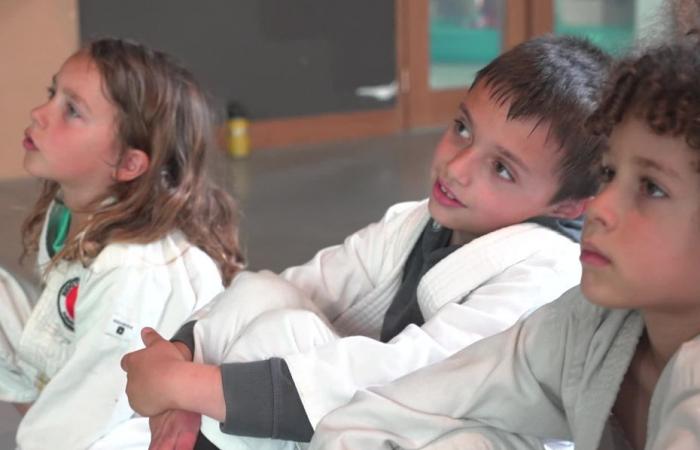
Autism, dyslexia, attention disorder… It is estimated that one in 6 French children has neurodevelopmental disorders. In Gard, a concerned mother decided to open a center to support these different children.
With her big mischievous eyes, her room full of toys and her spontaneous nature, Prentiss, 8 years old, looks like all the children her age. But he is a little different from his comrades: “It’s rare for me to understand others.“He admits to doing it.”a lot“nonsense: when he gets angry, he is quickly carried away by his anger”I’m mean to others, I hit them.“ Prentiss’ parents have three children before him. They quickly realize that the youngest is not like his brothers and sisters. In particular, he has a lot of difficulty managing the emotions that go through him.
duration of video: 00h03mn32s
The “House of Extraordinary Children”
•
©FTV.
If Prentiss is with a friend who has been hurt and is crying in pain, the child will be overwhelmed by his empathy.”and he will cry too” says his mother, Jennifer Pallier. From a very young age, the child has had difficulties in his relationships with others, he talks a lot, systematically interrupts conversations and has major tantrums with his family. According to several health professionals, he could have an attention disorder, often abbreviated “ADD”, a high intellectual potential, known as “HPI”, and a high emotional potential, a “HPE”. He is also diagnosed with dyslexia. “In the event of a major event, a big problem“, the 8-year-old boy can urinate on himself, explain his parents. A behavior which immediately alerts them: their son must be accompanied. After consulting numerous medical professionals in the region, they find a solution in Sauve , in the Gard, a few dozen kilometers from their home.
For several years, Prentiss and her mother have gone every Wednesday to the House of Extraordinary Children, the “MEEX” for the regulars. They have three meetings this afternoon. This structure created in 2015 brings together around ten professionals in health (psychomotor, speech therapists, psychologist, nutritionist) and well-being. The house welcomes more than 300 children each year. Its goal ? Bring together in the same place professionals specializing in invisible disabilities in children, who work collaboratively.
With her speech therapist, Prentiss learns to segment words. Thanks to his support, his difficulties in French were reduced. After an exercise in reading puns, Mélodie Chalandar, the speech therapist, smiles: “For me it’s a victory because today he laughed while tying! This means that he puts meaning into words, whereas six months ago he wouldn’t have even wanted to read.“There are more than 80 families on its waiting list. Many “dys” children, like Prentiss, whose difficulties are often spotted at school. Is there an explosion of cases of so-called children ADHD, dyslexics, HPI or HPE in recent years Not necessarily according to the professional: “Before these children also existed but they were called dunce caps. Today, their difficulties are considered and they are diagnosed much more than before.“
“Children called ADD or HPI are the dunce hats of the past. There are no more of them, they are simply diagnosed more.”
Mélodie Chalandar, speech therapist at the House for Extraordinary Children
Each month, Prentiss’ parents spend around a hundred euros on unreimbursed appointments and activities at the House for Extraordinary Children. But for the family, it has become a need: their son does not want to be accompanied anywhere other than the MEEX. After the speech therapist, he continues with a sophrology session. Jean-Luc Marchesani teaches the child, who moves and speaks almost continuously, to settle down and calm down. But also to reduce the intensity of these emotions that overwhelm him, through several relaxation exercises.
It is estimated that one in six French people have at least one neurodevelopmental disorder. Cécile Martignac is the mother of two children whom she describes as “extraordinary“: one has autism, the other has an attention disorder. It was she who had the idea of creating the House for Extraordinary Children, after a stay in Canada. A structure that was missing to this rural territory of Gard according to her, and which is unique in France.The whole challenge for these children is to be taken care of early. The earlier you intervene, that is to say between the first three and six years of life, the more you reduce the risk of disability. “The House of Extraordinary Children”it is first-line care, in collaboration with health establishments in the sector and schools“, specifies the director.
In addition to traditional support for children with healthcare professionals, MEEX also offers collective workshops such as “the little Jedis”: a workshop led by a psychomotor therapist and a sophrologist, which combines judo and relaxation. Parents can also benefit from tailor-made workshops to learn to understand how their child functions. Although this concept may seem explosive, it is already getting people talking. The House for Extraordinary Children was selected among the finalists of the La France s’engage foundation competition this year, which rewards the best projects.of social innovation.“Isère, Haute-Savoie and Meurthe-et-Moselle are considering developing the concept on their territory.





